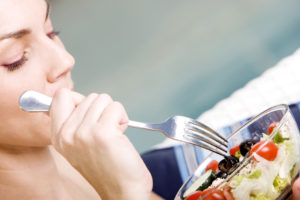What Is Low Fat Diet Food?

It seems that just about every week we hear about a new low fat diet food that will help us lose weight. Whether that’s a juicing diet, Atkins diet, Vegan diet, South Beach diet or just purely starving ourselves!
In the last few of years, studies have been conducted to show that not only are low fat diets reasonably ineffective in spearheading weight loss, some of them are quite detrimental to health and may actually cause you to increase in weight in the long run.
Why ‘Low Fat’ Diet Food Might Not Help You Lose Weight
Low fat diet food is essentially any food regimen offering low calorie content. This is also the premise behind low-fat yogurt and milk. In a research that was published in Lancet Diabetes and Endocrinology, 53 random clinical trials out of approximately 68,000 participants who followed either a high fat or low fat diet were analyzed. The outcome of the research showed that low fat diets were less effective for weight loss compared to certain high fat diets.
In a separate but related research in Spain, around 7,500 obese and overweight people were enrolled for a study by Ramon Estruch of the University of Barcelona. Research findings showed that the individuals who ate high-fat healthy food didn’t have considerable weight gain over their counterparts who ate low fat diets.
Free Report: Top 5 Exercise Mistakes
Not All Fats Are Bad
What the results show us is that the fat content of food has very little to do with whether or not it’s unhealthy and will cause you to gain weight. Healthy foods with a high fat content such as eggs and avocados are a normal part of many healthy diets and don’t cause weight gain as a whole. On the other hand, some of the ‘low fat’ diet foods such as low fat ice-cream contain unhealthy processed fats which are the causative agents for high cholesterol.
Natural fats in whole food have also been shown to actually aid individuals trying to lose weight. This is because they are source of energy for the body, which reduces the need for cravings. At the same time, healthy fats are a major source of satiety which is the ‘full feeling’ you get from eating food. Satisfied people tend to eat less.
Depriving Yourself Won’t Lead to Weight Loss
We hear it all the time that high fat foods, carbohydrates and sugar-rich foods, are fattening. So, when trying to lose weight we stop eating these foods. We focus on other options such as proteins, whole foods, smoothies, green juices, etc. What happens next is total failure and disappointment, as anyone who has ever deprived themselves certain high fat or high calorie foods to lose weight will tell you.
There’s is no point in depriving yourself to lose weight because such a diet doesn’t work in the long haul. Instead, you should work at forming healthy eating habits that can be integrated into your lifestyle. For example, if you’re in the habit of eating half a gallon of ice cream in one go, reduce that portion to about half a cup. Also cut down on the frequency in which you enjoy this creamy delight. By simply applying moderation, watching portion sizes and getting plenty of exercise, you will lose weight.
Enjoy A Healthy And Balanced Diet
When you’re trying to lose weight your diet needs to meet your individual needs based on your age, gender, body type, lifestyle and goals. For example, a post-menopausal woman who is vegetarian will need very different recommendations than a 24-year-old male who smokes. For the most up to date and relevant diet to suit you and your lifestyle download the My Food Diary.
This highly-acclaimed food database contains over 100,000 foods to improve your diet beyond just counting calories. Plus the exercise log can calculate calories burned for over 700 activities from traditional exercise to lifestyle activities to non-traditional exercise. Avoid any more confusion about low fat diet food with this handy app that’s available in desktop, iPhone and mobile versions.

